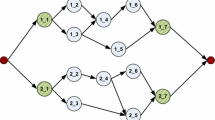Abstract
One of the important steps in the process of project planning is the designing of logical precedence network. As the procedure of the logical precedence network planning is case dependent and varies in different projects, it could be considered as an unstructured and complex problem which should be solved by implementing the implicit domain knowledge of the planner. In this paper, we have shown how the artificial neural networks could be implemented to plan the finish-to-start logical precedence network of projects. The implementation results depict that the proposed methodology could result reasonable, accurate, and reliable outcomes, which could be used as a primary solution, which can enrich the acquired knowledge, after the accomplishment of the project and its practical corrections.
Similar content being viewed by others
References
Agarwal A, Colak S, Eryarsoy E (2006) Improvement heuristic for the flow-shop scheduling problem: an adaptive-learning approach. Eur J Oper Res 169(3):801–815
Agarwal R, Tiwari MK, Mukherjee SK (2007) Artificial immune system based approach for solving resource constraint project scheduling problem. Int J Adv Manuf Technol 34:584–593
Arizono I, Hara S, Ohta H (1993) Neurons with an immunological rejective function and their application to scheduling problems. International Joint Conference on Neural Networks, Nagoya, Japan, 2, pp 1520–1523
Cardeira C, Mammeri Z (1994) Performance analysis of a neural network based scheduling algorithm. IEEE Parallel and Distributed Real-Time Conf., pp 38–42
Chen RM, Huang YM (2001) Competitive neural network to solve scheduling problems. Neurocomputing 37:177–196
Chaudhuri A, De K (2010) Job scheduling problem using rough fuzzy multilayer perception neural networks. J Artif Intell Theory Application 1:4–19
Duncan WR (2004) A guide to the project management body of knowledge (PMBOK). Project Management Institute (PMI) Standard Committee, Newtown Square
Gaber TM, Rabelo LC, Hosny OA (1992) An integrated artificial neural networks model for industrial projects risk assessment. IEEE Engineering Management Conference, pp 206–210
Gao L, Qian W, Li X, Wang J (2010) Application of memetic algorithm in assembly sequence planning. Int J Adv Manuf Technol 49:1175–1184
Hashemi Golpayegani SA, Emamizadeh B (2007) Designing work breakdown structures using modular neural networks. Decis Support Systems 44:202–222
Partovi FY, Anandarajan M (2002) Classifying inventory using an artificial neural network approach. Comput Ind Engineering 41:389–404
Ruegsegger SM (1993) Intelligent scheduling optimization using a rule-based artificial neural network. IEEE Aerosp Electron Conf 2:800–806
Turban E (2000) Decision support systems and intelligent systems, 6th edn. Prentice Hall, Upper Saddle River
Weckman GR, Ganduri CV, Koonce DA (2008) A neural network job-shop scheduler. J Intell Manuf 19:191–201
Xia W-J, Wu Z-M (2006) A hybrid particle swarm optimization approach for the job-shop scheduling problem. Int J Adv Manuf Technol 29:360–366
Author information
Authors and Affiliations
Corresponding author
Rights and permissions
About this article
Cite this article
Golpayegani, S.A.H., Parvaresh, F. The logical precedence network planning of projects, considering the finish-to-start (FS) relations, using neural networks. Int J Adv Manuf Technol 55, 1123–1133 (2011). https://doi.org/10.1007/s00170-010-3125-1
Received:
Accepted:
Published:
Issue Date:
DOI: https://doi.org/10.1007/s00170-010-3125-1




